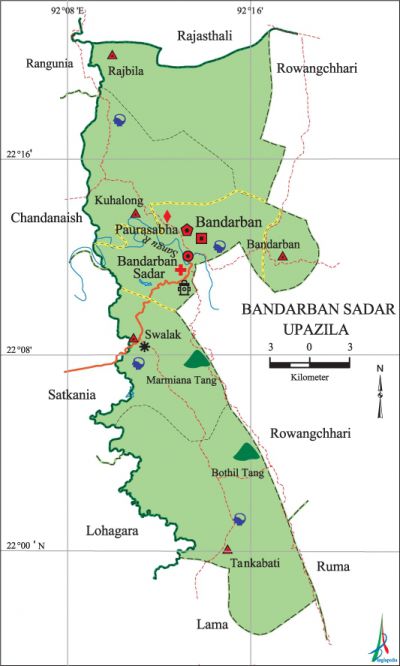Bandarban Sadar Upazila
Bandarban Sadar Upazila (bandarban district) area 501.98 sq km, located in between 21°55' and 22°22' north latitudes and in between 92°08' and 92°20' east longitudes. It is bounded by rajasthali upazila on the north, lama upazila on the south, rowangchhari and ruma upazilas on the east, rangunia, chandanaish, satkania and lohagara upazilas on the west. Marmiana Tang and Bothil Tang hills of this upazila are notable. There are a number of waterfalls in the upazila.
Population Total 88282; male 47687, female 40595; Muslim 39600, Hindu 6862, Buddhist 33051, Christian 4511 and others 4258.
Water bodies sangu river and Swalak canal are notable.
Administration Bandarban Thana was formed in 1923 and it was turned into an upazila in 1984.
| Upazila | ||||||||
| Municipality | Union | Mouza | Village | Population | Density (per sq km) | Literacy rate (%) | ||
| Urban | Rural | Urban | Rural | |||||
| 1 | 5 | 16 | 225 | 41434 | 46848 | 176 | 67.1 | 32.7 |
| Municipality | ||||||||
|
Area |
Ward |
Mahalla |
Population |
Density |
Literacy rate | |||
| 13.05 | 9 | 68 | 41434 | 3175 | 67.1 | |||
| Union | ||||
| Name of union and GO code | Area (acre) | Population | Literacy rate (%) | |
| Male | Female | |||
| Kuhalong 31 | 20745 | 5696 | 5379 | 34.7 |
| Tankabati 79 | 37726 | 3007 | 2764 | 11.1 |
| Bandarban 15 | 14088 | 4902 | 4317 | 38.3 |
| Rajbila 47 | 25158 | 4651 | 4472 | 29.0 |
| Swalak 63 | 18283 | 6240 | 5420 | 39.6 |
Source Bangladesh Population Census 2011, Bangladesh Bureau of Statistics.

War of Liberation During the war of liberation in 1971 Bandarban was under Sector 1. The Pak army conducted mass killing and plundering in this upazila; they also set many houses on fire. Freedom fighters of the upazila had an encounter with Pakistani soldiers at a place named Kya Ching Ghata. There was another encounter between the freedom fighters and Pak army at Dhopachara. A memorial monument has been built in the upazila.
For details: see বান্দরবান সদর উপজেলা, বাংলাদেশ মুক্তিযুদ্ধ জ্ঞানকোষ (Encyclopedia of Bangladesh War of Liberation), বাংলাদেশ এশিয়াটিক সোসাইটি, ঢাকা ২০২০, খণ্ড ৬।
Religious institutions Mosque 101, temple 10, church 22, math 2, sacred place 1, keyang 70, ashrama 3.
Literacy rate and educational institutions Average literacy 49.3%; male 54.4%, female 43.2%. Educational institutions: college 2, technical college 1, secondary school 15, primary school 66, community school 4, kindergarten 1, madrasa 2. Noted educational institutions: Bandarban technical school and college, Bandarban Cantonment Public School and College, Bandarban Government High School, Sangu High School, Bandarban Government Girl's School, Bandarban Ideal Government primary school.
Newspapers and periodicals Daily: Natun Bangladesh, Sachitro; fortnightly: Sangu; Periodical: Bandarban, Nilachal, Chimbuk.
Cultural organisations Library 2, club 4, community centre 1, Shilpakala Academy 1, Shishu Academy 1, auditorium 2, cultural organisation 18, women organisation 76, tribal cultural institute 1, cinema hall 1, playground 6.
Tourist spots Bandarban Golden Temple, Meghla, Nilgiri, Shoila Propat and Rajbari.
Main sources of income Agriculture 47.01%, non-agricultural labourer 8.13%, industry 0.28%, commerce 13.76%, transport and communication 2.93%, service 16.01%, construction 3.24%, religious service 0.31%, rent and remittance 0.75% and others 7.58%.
Ownership of agricultural land Landowner 31.07%, landless 68.93%; agricultural landowner: urban 18.63% and rural 45.52%.
Main crops Paddy, sesame, cotton, turmeric, ginger, vegetables.
Main fruits Banana, pineapple, papaya, jackfruit.
Fisheries, dairies and poultries Fishery 56, dairy 7, poultry 20.
Communication facilities Pucca road 93 km, semi-pucca road 112 km, mud road 460 km; waterway 30 km.
Extinct or nearly extinct traditional transport Palanquin, bullock cart and horse carriage.
Cottage industries Weaving, wood work, bamboo and cane work.
Hats, bazars and fairs Hats and bazars are 7, fairs 1, most noted of which are Bandarban, Suwalak and Balaghata hats. Purnia Mela of Bomang Raja is notable.
Main exports Banana, bamboo, cotton, ginger, turmeric, tribal dresses.
Access to electricity All the wards and unions of the upazila are under rural electrification net-work. However 54.3% of the dwelling households have access to electricity.
Sources of drinking water Tube-well 37.6%, tap 26.8% and others 35.6%.
Sanitation 50.4% of dwelling households of the upazila use sanitary latrines and 27.2% of dwelling houses use non-sanitary latrines; 22.4% of households do not have latrine facilities.
Health centres Upazila health complex, union health and family welfare centre 5, family planning centre 1, maternity and child welfare centre 2, community clinic 2, diagnostic centre 6, animal treatment centre 4.
NGO activities Operationally important NGOs are brac, proshika, caritas. [Atikur Rahman]
References Bangladesh Population Census 2001 and 2011, Bangladesh Bureau of Statistics; Cultural survey report of Bandarban Sadar Upazila 2007.
